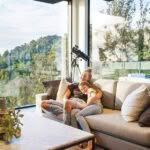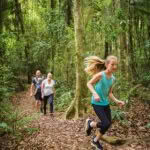How a blueberry grower and his son took the family business from Ōhaupō to the world
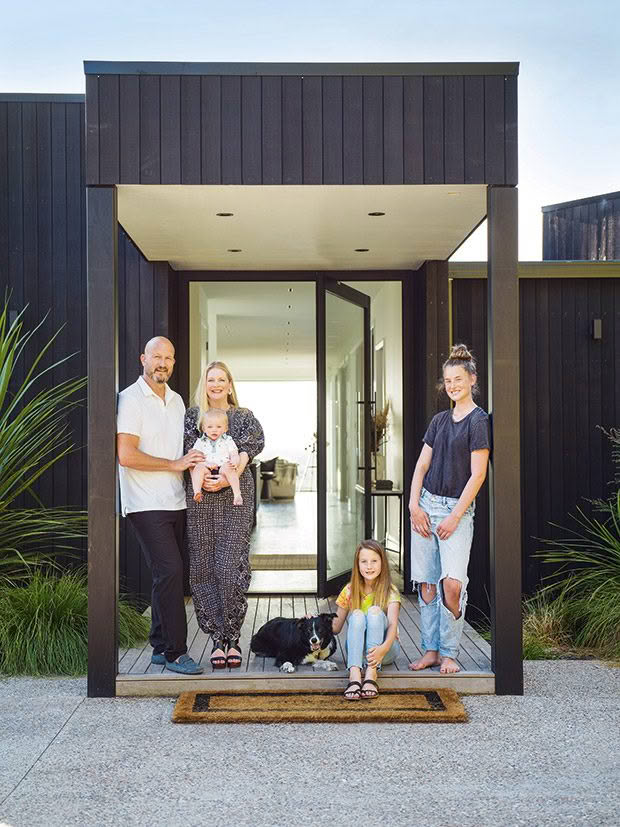
Geoff and Maura Furniss have an open-door policy for anyone willing to make the short trek to their home at Maungākawa, north of Cambridge. “We create our own fun,” says Maura, holding Conor. Mixed-border-collie Darby, Estelle (11) and Celeste (14) are more than happy to oblige.
A mad idea sown in a tin shed has grown into a bountiful business, taking this go-getting family from the Waikato to the world.
Words: Cari Johnson Photos: Rachael McKenna
For most, a blueberry is just that. A blueberry. There’s no need to notice its distinct squishiness nor how easily it pulls off the vine, but for Geoff and Maura Furniss, tiny details matter when picking the perfect little blue fruit.
“We’re very particular about our blueberries,” says Maura.
The Cambridge residents are not farmers but are equally wise to what distinguishes a good blueberry from a bad. At Blueberry Country, the country’s largest blueberry orchard in nearby Ōhaupō, attention to detail is what put this pioneering family on the horticultural map.
Blueberries — and big ideas — run in the Furniss DNA. Geoff was only 10 years old, living on his parent’s cattle farm, when his father Greg decided to make room for a more — well — colourful addition to the property.
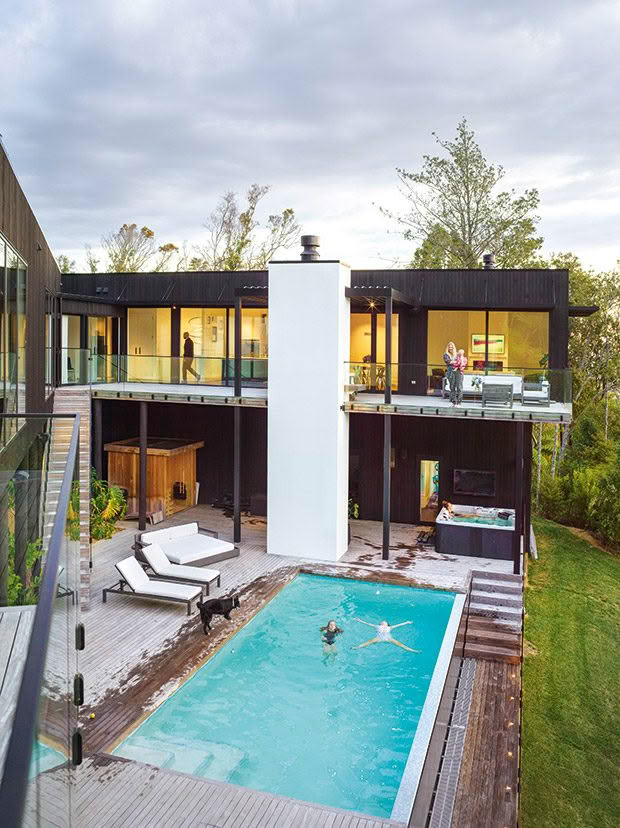
The horseshoe-shaped home lends itself well to parties, which the Furnisses host throughout the year. Their get-togethers are much anticipated among their (ever-increasing) circle of friends. For Halloween, the couple lit more than 300 candles and sectioned off rooms with makeshift curtains.
Greg, intending to become a science teacher, had gotten a bit sidetracked with peat soils while researching for his post-graduate studies. Blueberries were a far better fit than cattle for his aspiring peat-soil experiments. “It was the most random of all random things,” says Geoff.
Sometimes random ideas bear the most fruitful rewards. Later, when the blueberry bushes were growing nicely, Greg dreamed of taking his berry operation to the next level. Optical fruit-sorters were available overseas but for a Waikato farmer in the 1990s, importing such a machine was a costly thing. “Right,” he thought. “I’ll just build one myself.”
And so he did. Greg and a local engineer began tinkering in an old tin shed, and within a few years, they unveiled a machine that sorted the best of the blues by colour variation. By 2000, he was exporting the sorter under a slick acronym for Blueberry Country: he called it BBC Technologies.
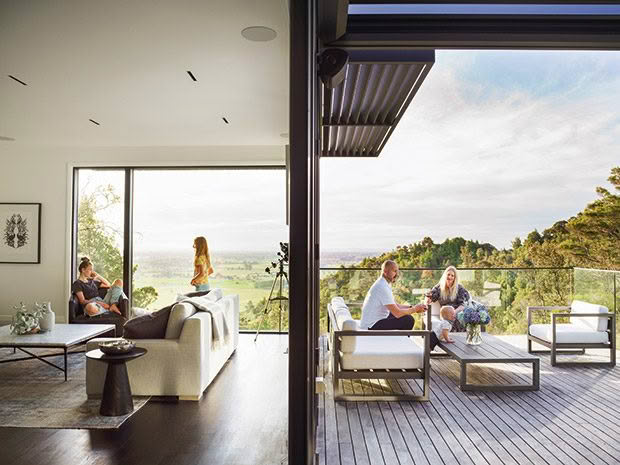
The couple celebrates natural materials in the open-plan living room, such as wooden flooring and a marble-topped coffee table. “It’s our haven away from our demanding lives.”
“It makes zero sense,” says Geoff. “An Ōhaupō farmer creating a world-class optical sorting machine? But looking back at New Zealand in the 1990s, inventions like these were necessary because we didn’t have a strong connection to the rest of the world. Internet connections weren’t evolved then, and there was no one to install the equipment for you. People had to invent things.”
On a sun-soaked deck in the Maungākawa hills, Geoff takes a rare moment to rest after a dawn-to-dusk slog of Zoom conferences. Daylight is fading, but he remains alert, expecting a video call from Europe at 8pm. Like his father, Geoff had ideas that extended beyond the blueberry bushes.
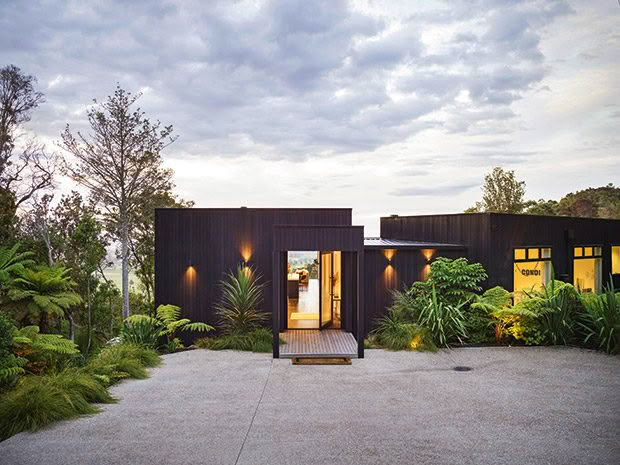
Designing a house around the steep, bush-clad section, with the help of architect Daniel Cullen, was like a high-stakes game of Tetris. “It’s a particularly tricky site with the various covenants around it. If we touched certain trees when building, it would have resulted in a $250,000 fine,” says Maura.
He left the family orchard in his 20s to pursue a commerce degree and ended up, of all places, at a software company in Denver, Colorado. Meanwhile, his father’s fruit-sorting side-hustle was gaining traction overseas. Geoff saw the untapped potential and raised his hand to join the family business, establishing its first international office in the United States in the early 2000s.
When Geoff sets his mind on something, he tends to make it happen. Over the years as chief executive of BBC Technologies, he rolled up his sleeves and met with berry growers worldwide. After all, the Furnisses are in the business of berries — and cherries and tomatoes, any soft fruit that can be graded, sorted and packaged. That’s not to say there weren’t any hiccups along the way. Geoff recalls a time he didn’t fork over extra cash for a carpeted booth at their first European trade show.
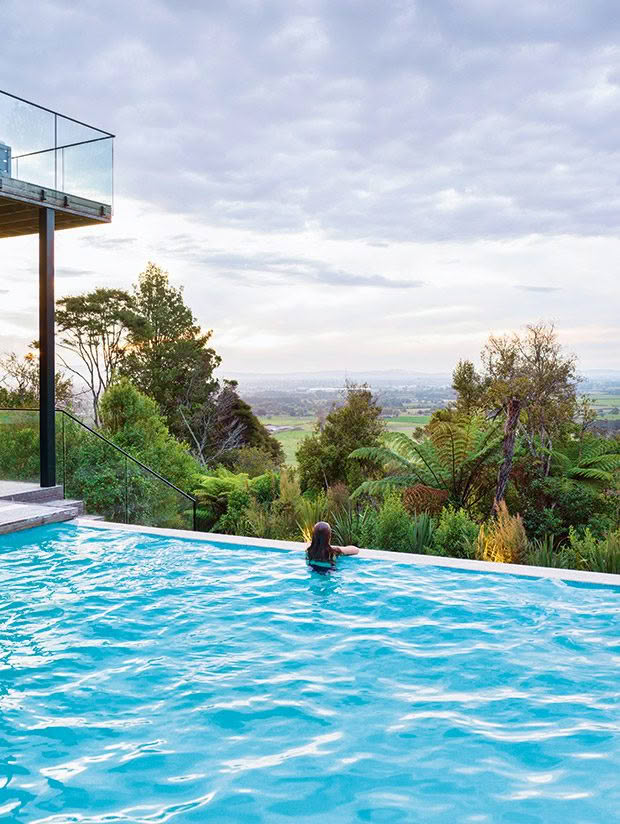
The 360-square-metre home — and infinity pool — overlook land protected by QEII covenant.
Rookie mistake. “We were pretty much the only booth that hadn’t paid for carpet. We looked like poor kids from New Zealand, so we had to purchase rugs from some furniture store nearby,” he says.
When Geoff started, BBC Technologies was exporting three to four machines a year. Today, the company exports to 39 countries and has a 60 per cent global market share. He gained a foothold in the world market, and while scrambling his way to the top, contracts were signed, more offices built.
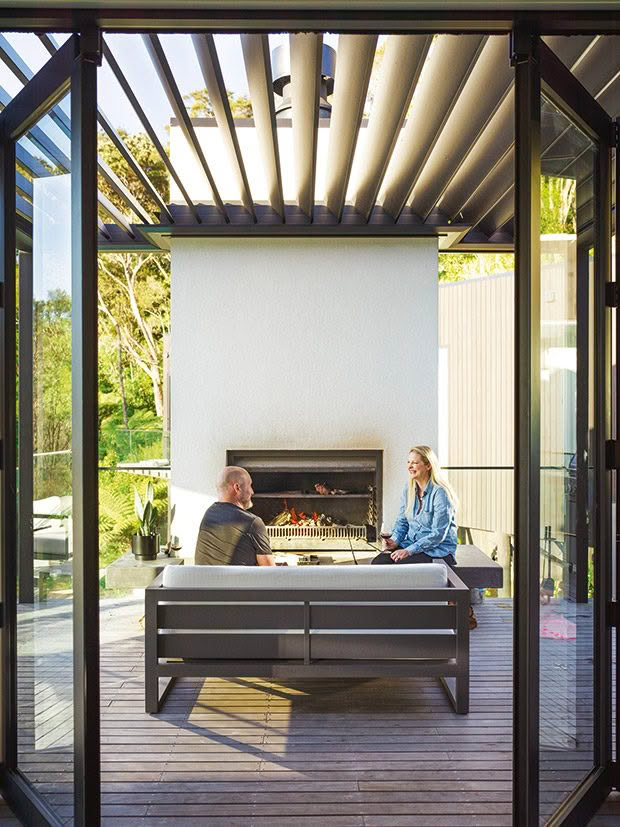
Weeknight barbecues are good practice for the couple’s annual Fourth of July party (a nod to Maura’s American heritage), where dozens of guests partake in a “grilling” competition. Ribeye scotch fillets, beer-can chicken and homemade sausages were among last year’s contenders.
The business is how Geoff, once a boy helping his parents in the berry packhouse, ended up in New Orleans one balmy evening and locked eyes with his future wife.
AS A YOUNG GIRL, Maura Furniss had a premonition: “I always knew I wasn’t going to marry an American.” It wasn’t beyond reason for this girl from Puyallup, a sprawling farming town on Seattle’s outskirts. Maura grew up with an American mum and an Irish father, two souls from opposite sides of the world engaged within three months.
She caught the travel bug while visiting her Irish relatives when she was a child, and on the day she graduated high school, she and her backpack were crossing the world to Paris.
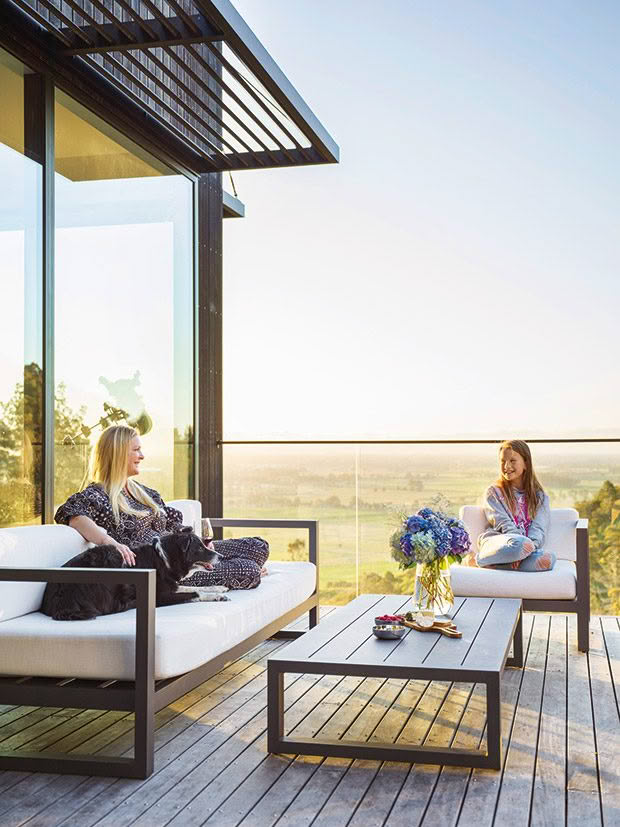
“Traveling overseas is common in a lot of cultures, but in a small town like mine, many people don’t leave,” she says. Travel never stopped, though Maura did pause long enough to earn a graphic design degree, bouncing between design and sales roles until she could fund her next excursion.
It was a serendipitous encounter when Geoff, while on a business trip to New Orleans, exchanged a smile with Maura at a nightclub on Bourbon Street. She dragged him onto the dance floor.
“It wasn’t love at first sight,” confesses Maura, who was on a girls’ trip at the time. “But as soon as we touched, I knew we were going to marry.”
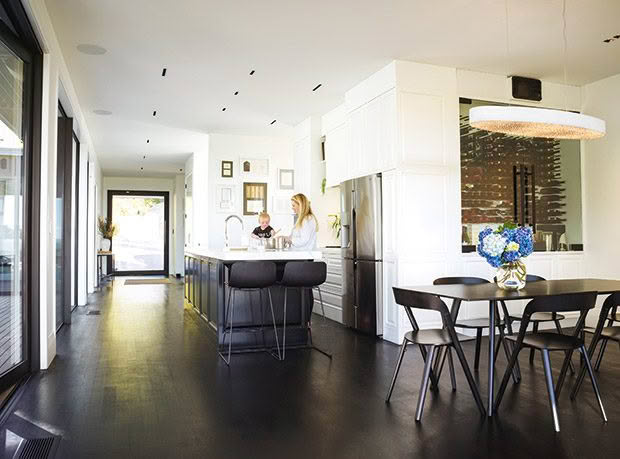
Geoff and Maura framed a handful of menus and wine pairings from their favourite restaurants worldwide and mounted them next to the marble kitchen bench.
Many months later, Maura received an unexpected email. That strapping man with the funny accent she had met in New Orleans was visiting Seattle for business. (Geoff now admits that his only business in Seattle was seeing Maura again.)
Their first date was telling. “He shows me this land on Google Earth,” says Maura, gesturing to the bush surrounding the home they built three years ago. “And tells me about a vision he had to build a house.” No less than a year later, they were engaged. Her family didn’t bat an eyelid when she packed up her life to join Geoff and his two daughters in a country that she had never visited. In 2016, her premonition came true.
In true family spirit, Maura was brought into the fold at BBC Technologies as soon as her work visa was approved. “I was hired for one project, but it was all-hands-on-deck with the way the company was growing. I think all family companies are like that — you do what needs to get done.”
In six years, this couple has amassed a lifetime of stories. Until a certain pandemic closed international borders, Geoff and Maura were never home longer than a few months at a time. It was tiring work, but they shared a love for new horizons, cultures and flavours. Multi-stop “round the world” tickets had them on as many as 22 flights in two weeks.
- Sisters Celeste and Estelle share a love of nature. Estelle, in particular, keeps a keen eye out for tūī and kererū. “She notices the tiniest details outside her bedroom window,” says Maura.
- The formal dining room is also home to Geoff’s temperature-controlled wine collection, which holds more than 200 bottles of wines from around the world.
- The home’s proximity to the Maungākawa Scenic Reserve Loop allows the family to explore their rugged backyard on a whim.
Geoff reminisces: “It’s a perpetual state of exhaustion. But it’s a privileged position to be able to see the world in a very intimate way, meeting the people who grow our food.”
Geoff never used to get a wink of sleep until his dear wife set him straight. Says Maura: “Did he realize the rest of the world sleeps through their flights? No. He would ruminate on his ideas for the business on each 13-hour flight. I informed him that the rest of the world sleeps for eight hours.”
In 2018, a multimillion-dollar deal was struck. The company sown in a tin shed in Ōhaupō was acquired by Norway-based technology company TOMRA; this year Geoff was appointed chief executive of TOMRA Fresh Foods to bring his team and another acquired company under one multinational roof. Life is still spent in hotels, with Geoff and Maura splitting their working week between the Hamilton and Auckland offices.
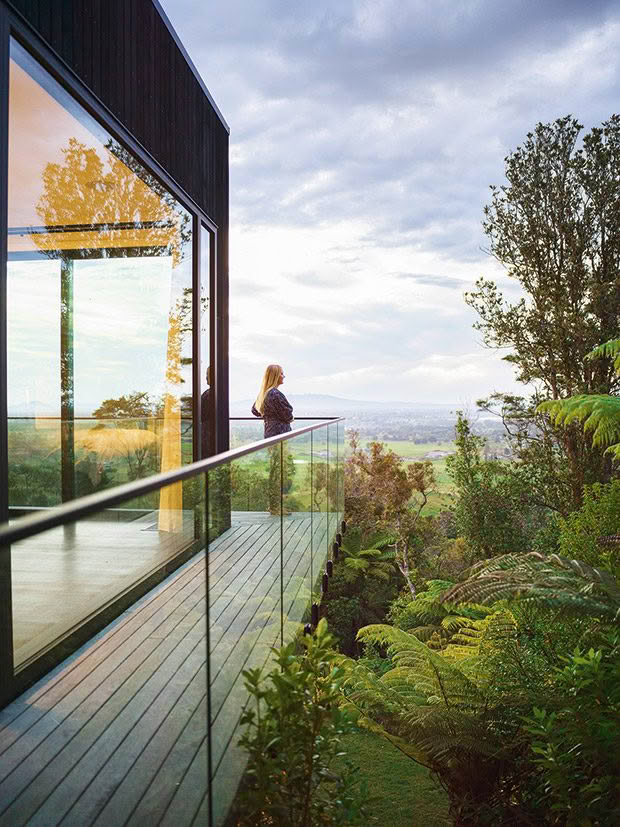
It’s fitting that the pair, based in Cambridge for the foreseeable future, live a 20-minute drive away from the paddock-turned-orchard that started it all. Geoff rolls a blueberry between his thumbs before popping it into his mouth — still not sick of them after all this time. His daughters Celeste (14) and Estelle (11), from his previous marriage, laugh as one-year-old Conor, the youngest Furniss, attempts to deposit his blueberry into a glass of water.
Meanwhile, Greg, Geoff’s father, is still up to his ears in ideas and has just finished planting an avocado orchard in Pirongia. “Dad decided it was a good idea even though no one else has done it in the area before. That’s how he works. He’ll have an idea and follow it through. There’s always a method to his madness.”
Maura chimes in: “It’s built into this family to do everything themselves. They sit around a table with a million ideas. But then they make them happen.”
CREAM OF THE CROP
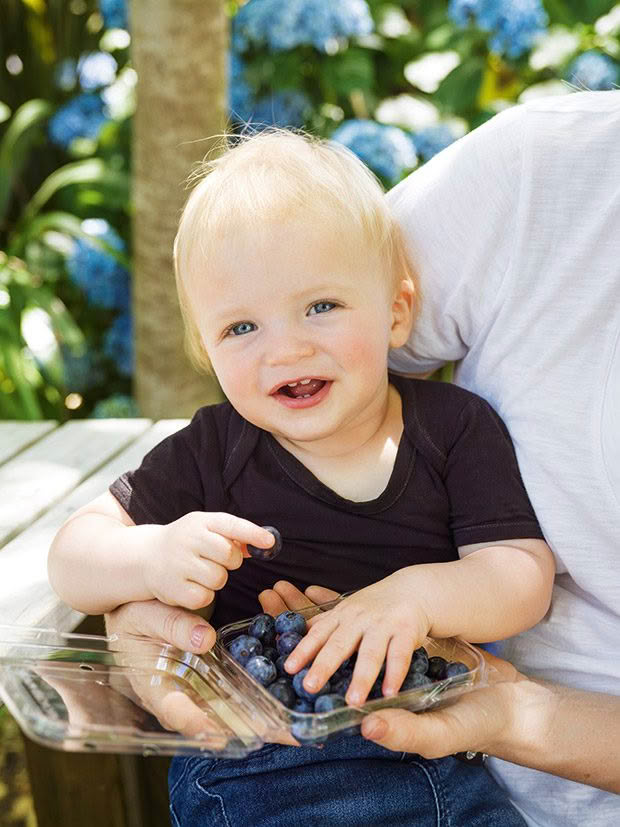
Few would have predicted that a Waikato farmer would be a pioneer in the global fruit-sorting industry. Since its launch in 2000, BBC Technologies has led the way with colour sorting, defect rejection, grading and clamshell packaging solutions for berries and other soft fruits.
Technology is still designed down the road from the family orchard in Ōhaupō. Blueberry Country, which also has orchards in Waipū, Ngātea and Southland, is where 40 blueberry varieties are studied for the BBC Technologies Berry Science Programme.
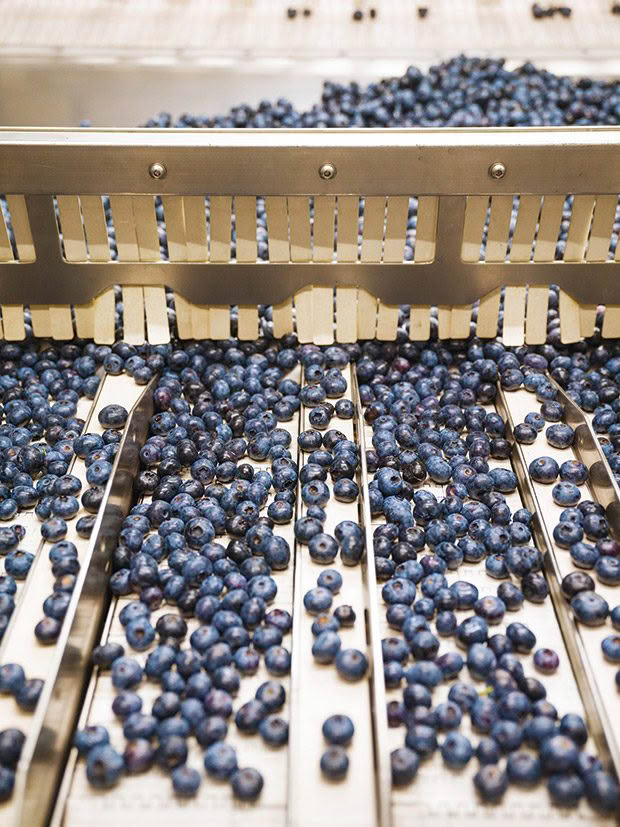
The company’s investment in R&D, spearheaded by Geoff, has resulted in the most extensive library of berry samples and data in the world. “We’re producing technology that can find a 0.02-millimetre defect on a blueberry traveling at lightning speed through a machine,” says Maura. “It’s only natural that we’re very particular about details.”
In 2019, BBC Technologies used its berry expertise to launch the first-ever machine using artificial intelligence for blueberry grading. Now under ownership by the Norway-based technology company TOMRA, the company plans to expand its R&D programme with a $14 million research and development centre near Hamilton Airport later this year.
GEOFF’S TIPS FOR SUSTAINABLE BUSINESS GROWTH
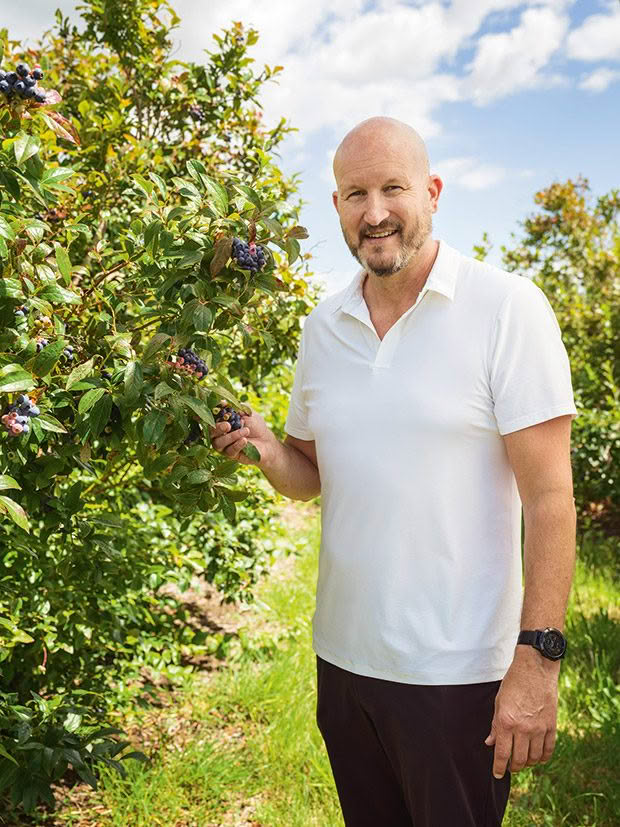
Listen to your customer. “Don’t make a product and then find a customer. Start with the customer and figure out: Do they want your product? Do they see value in it? Will they pay for the value? Will there be enough money after all that to pay your wages?”
Always challenge yourself. “A company that thinks it knows everything may be caught off guard by competitors. Invest in understanding the customer, the product and the industry.”
Build people up. “My objective is always to be influential but not important. I try to provide insight but make sure I’m not getting in the way or stopping anyone from growing.”
Don’t expect perfection. “Leadership is a funny thing; it takes a lot of time, experience and mistakes along the way. You have to make mistakes, recognize them as mistakes, and evolve from the mistakes.”
Love this story? Subscribe now!
 This article first appeared in NZ Life & Leisure Magazine.
This article first appeared in NZ Life & Leisure Magazine.
